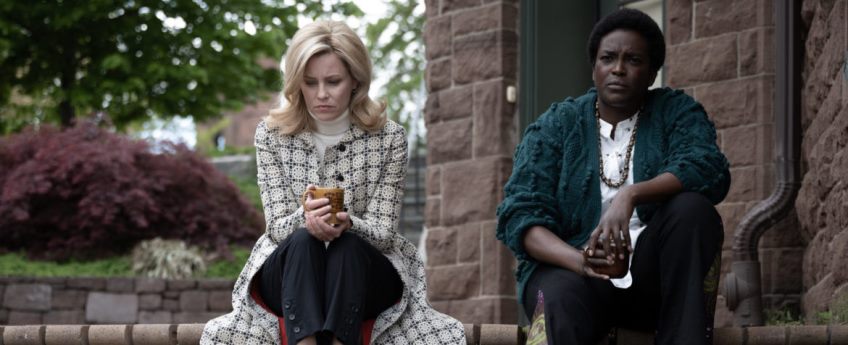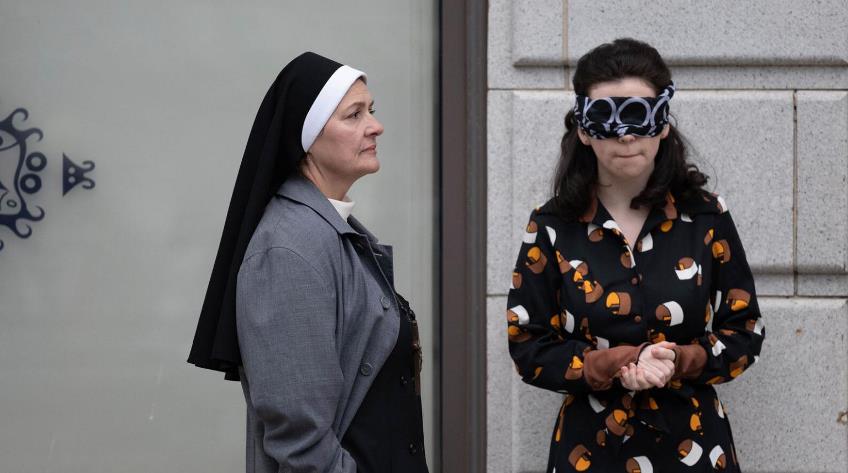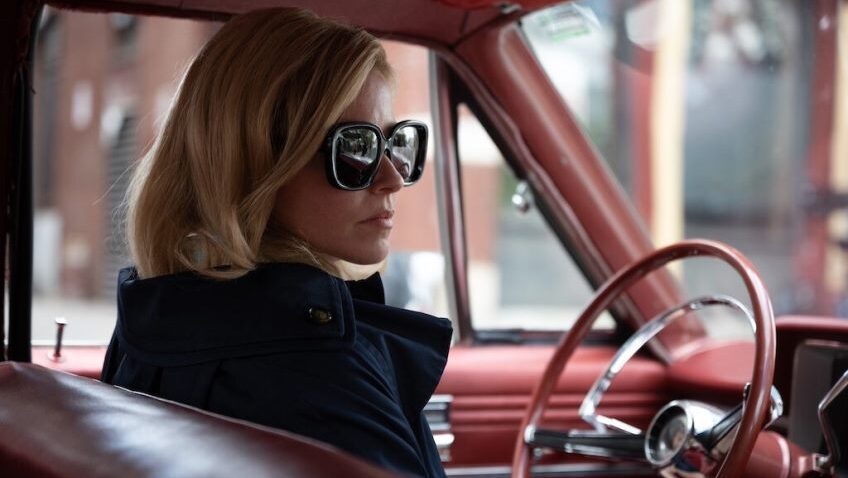Joyce Glasser reviews Call Jane (November 4, 2022) Cert 12, 121 mins.
Though based on real people and true events between 1968 and the Roe vs Wade decision in 1973, director Phyllis Nagy’s Call Jane, written by Hayley Schore and Roshan Sethi, is more than historical fiction. The film takes on a new timeliness with the overturning of that decision in 2022 resonating today as a warning and a reminder. In anticipation of the legal chances to State constitutions, we read about organisations like Call Jane, or The Jane Collective, popping up across the USA, helping woman achieve freedom of choice over their bodies and reproductive rights.
The filmmakers take us on a journey through a pretty, intelligent but ordinary late 1960’s housewife (the costume, hair and make-up department make that clear), named Joy (Elizabeth Banks, excellent). Joy could be modelled after a real life Jane operative named Jenny. But surprisingly, as it usually serves as USP for any film, there is no caption at the start telling us the film is inspired by real events or people.
Joy is happily married to Will (Chris Messina) a defence-attorney, with whom she has a teenage daughter named Charlotte (Grace Edwards), and – here’s the rub – an unexpected, but eagerly awaited second baby on the way. Speaking of rub, Will is the kind of guy who asks his wife to rub his feet, while, at the same time, asking her to look over the Kramer brief with him. Though there is no suggestion that Joy, with her legal mind and writing skills, should go to law school, her husband praises her intervention, telling her, ‘you made me sound like Clarence Darrow.’
Yet the Women’s Liberation Movement is gathering pace outside their doors, and change is the in air. In an early scene we see Joy and Will about to leave a function at a downtown Chicago hotel where long-haired protest marchers march outside. ‘You can feel a shifting current,’ Joy murmurs prophetically to her husband.

While dancing in the kitchen with Charlotte, Joy collapses. At the hospital, she learns she has a heart condition and a 50/50 chance of dying if she goes through with the pregnancy. Though naturally distraught at the news, it is the reaction of the hospital and lawyers that makes her indignant. ‘A healthy baby, that’s it?’ says Joy, ‘with no regard for the mother?’
A lawyer tells her if she can convince two doctors, she is suicidal she can get a termination. A friend jokingly tells her to fall down the stairs. Forging her husband’s signature, Joy withdraws money from the bank and shows up at a sleazy clinic. She cannot go through with it and not on moral grounds.
Then she notices a poster on the side of a mailbox: “Pregnant? Anxious? Call Jane,” and a phone number. When she calls there is no one named Jane. But there is help. Joy has her abortion and becomes interested in the doctor performing the procedure, named Dean (Cory Michael Smith) as well as the procedure itself.
Call Jane, officially known as the Abortion Counselling Service of Women’s Liberation, did not operate out of one house or apartment as in the film, but throughout Chicago and went through several transformations, some indicated in the film.
On her first visit, Joy meets the other women in Virginia’s “cell,” and of course, Doctor Dean. Surprisingly, there is a nun, Sister Mike (Aida Turturro), who is the receptionist and administers a bowl of comforting post procedure pasta to the patients. It is Gwen (Wunmi Mosaku) a representative of the new Black Power movement who argues with Virginia that Dean’s high fees are prohibitive to the large population of ethnic women in Chicago.

Following her procedure, Virginia asks Joy to help out by driving patients without transportation to the apartment. Though she declines, wishing to erase the experience from her mind, she is drawn back, and gradually becomes a regular.
In the film the face of Call Jane is Virginia (Sigourney Weaver, on form) a committed, engaged feminist, very loosely based on Heather Booth. Now 76, Booth is a Jewish civil rights campaigner from Mississippi who became an activist for several political and social causes, chief among them the feminist movement.
Be aware, what you are about to read contains spoilers!
Telling her husband she is taking art lessons, Joy spends more time at the makeshift clinic, learning the procedure by, at first assisting Dean. Then, when the truth emerges about his bogus qualifications, she takes over, offering free abortions to women who cannot pay. In fact, Dean’s character is based on a real quack doctor and the ramifications of the revelation that Call Jane were offering back-alley abortions, apparently prompted half of the members to leave the organisation.
What was a major set-back to the movement, however, was the catalyst for what is the most astonishing aspect of the story. Joy adopted the old adage, “if you want something done right (and cheaply), do it yourself.”
What is so obviously missing from this engrossing, if docile, story is the legitimate suspense and tension that surrounds any underground group. Joy’s activities are illegal, and her husband is an attorney, sworn to uphold the law. The film would have us believe he was so trusting of his beautiful wife, and so busy with work that he was unaware of her long absences and secret codes and conversations following the illicit termination of her pregnancy, but would a judge or jury buy that?
You could argue that the filmmakers focused in on the wrong part of the story. One of the Jane apartments was raided in 1972 and seven women were arrested facing up to 110 years in prison! In what could have been a nail biting and then euphoric ending, their attorney managed to delay court proceedings in anticipation of the Supreme Court’s decision on Roe vs Wade. This might even give us an opportunity to see Joy’s legal mind, referred to early on, at work for her cause. The gamble paid off: with the decision, the women were freed and the Jane Collective, no longer necessary, was terminated.




